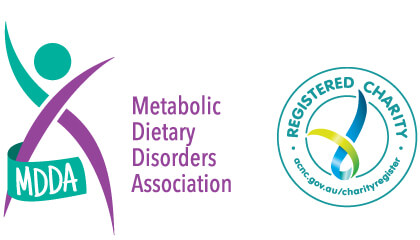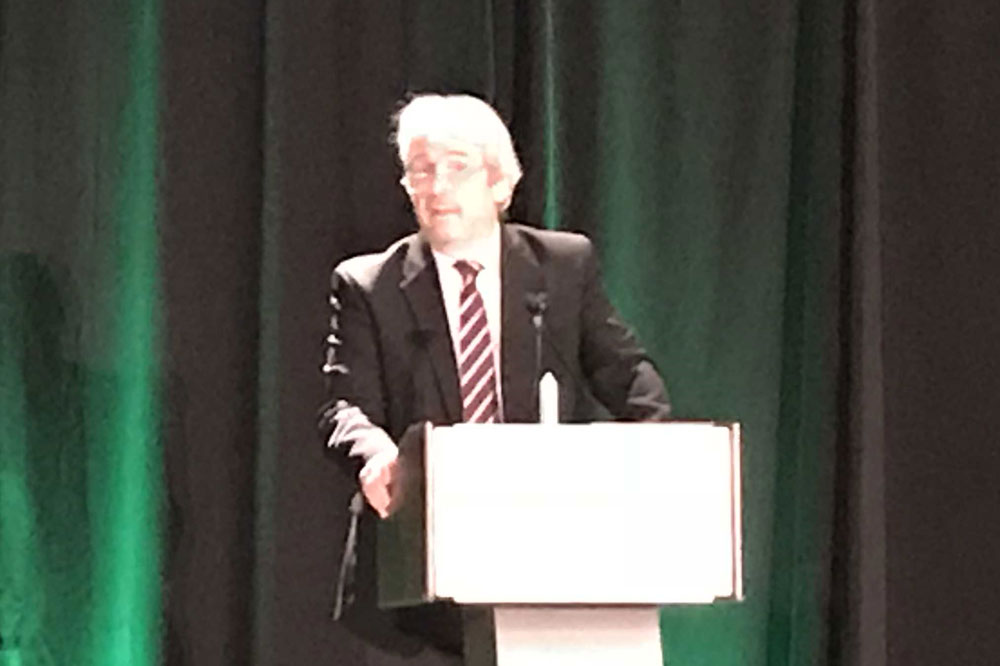Public announcement of the foundation of the Global Association for Phenylketonuria (GAP) on July, 6th, 2018 at the occasion of the NPKUA-Conference in Atlanta, Georgia (USA)Tobias S. Hagedorn, Founding Trustee of GAP
Introduction
Good morning everybody!
I am Tobias Hagedorn. Since 2001, I am the Secretary of the European Society for Phenylketonuria and Allied Disorders. Since 1997, I am a board member of the German PKU Association DIG PKU. Since 2011, I am their chairman.
My relation to PKU is quite simple, but likely somewhat different than most of yours: I am a husband of a PKU, and together we have two healthy children. So: When I met “my PKU” in 1990, she was sweet little sixteen and she knew exactly about PKU and her diet. I had to learn quickly, first of all that from an outside perspective living with PKU looks much easier than it really is. And I learned how blessed my wife was to be early diagnosed and having access to nutritional therapy.
This is not given all over the world.
I have a dream
I have a dream, that one day all children will have access to new-born screening and early diagnosis, and to adequate treatment. I have that dream!
I have a dream, that one day science will be able to offer us a treatment with minimal impact on our daily life and quality of life. I have that dream!
And I have a dream that PKU patients from all over the world will stand up and call health care providers and politicians to listen to them and to guarantee their dignity.
PKU and Populism
Ladies and Gentlemen, I changed the legendary speach of Dr. Martin Luther King, who was born right here in Atlanta. Dr. King represented a minority that was denied access to essential parts of public life, such as education and equal rights.
PKU patients and their relatives are a minority as well, with limited access to treatment and care, even in Europe and here in the United States of America, which we Germans consider the country of unlimited opportunities. Today, even in western democracies populists become more powerful again with too simple answers on too complex questions. But life is not simple, and we PKU patients and relatives know that better than most of our fellow citizens.
Newborn Screening
Globally, two third of all newborns have no access to screening. Statistically, every hour one unidentified PKU child is born. This means more than 700 PKU patients every month, nearly 9000 every year, all left to the fate of a life with severe mental retardation and physical handicap, that could be prevented by a simple blood spot on a piece of filter paper. Having no access to new born screening does not only mean to have no access to treatment and care. To deny access to new born screening means denying equal rights and human dignity to every single patient.
Global Mapping
In most parts of Europe, in Austral-Asia and North America, in all these so-called western democracies and developed industrial nations, health care systems are more or less well organised. We have educated health care providers and trained medical staff. We have industries that supply us with amino acid mixtures and low protein special food. We have researchers who work to collect evidence on the outcome of our treatment and to identify and implement alternative treatment strategies. We have nutritionists and dietitians who help us to make our lives a little bit better every day.
Yes, there are some gaps, even important gaps, such as insufficient reimbursement policies or the different treatment and management guidelines around the world. PKU is the same everywhere, however treatment strategies and access to care is significantly different even in our countries. But we have patients associations and advocacy groups like my ESPKU or your NPKUA and others, who tirelessly work to raise awareness on PKU and call for closing these gaps.
There are regions in the world, where all these achievements are not available, and patients are left behind, undiagnosed and untreated, not even being aware of their hopeless situation. Still, the perspectives of a PKU patient are highly dependent on his or her birthplace. We should not wait for the world to change it. We should take action and make a change ourselves.
Patients impact on PKU care
Patients can make a difference. Let‘s remember Liv and Dag Egeland, whose mother challenged Professor Følling to find out the reason for their retardation. Sheila Jones’ mother challenged Professor Bickel to find a treatment for her. And Professor Guthrie was motivated by his niece to create a tool to identify early all the few patients amongst all new born.
These are well known cornerstones in the history of PKU, and all of them were initiated by PKU families.
Announcement of the Global Association for Phenylketonuria (GAP)
This week, people from all over the world came to Atlanta to make history in PKU again.
I am proud and deeply humbled that it falls to me to publically announce the foundation of the Global Association for Phenylketonuria as a charitable and independent patients’ organisation.
Just to quote another famous American: This is a small step for me, but a giant leap for PKU across the world.
The Mission and Vision
* Our vision is that all people living with PKU despite their origin are able to reach their full potential. We will advance PKU a global health priority, and strengthen PKU associations and groups throughout the world.
* As people living with PKU, we will create a global platform for PKU advocacy that includes ensuring universal access to new-born screening and diagnosis, treatments and comprehensive care;
* We will mentor like-minded patient associations and groups and offer best practices and support that are sensitive to their experiences, culture, languages and laws;
* And we will increase collaboration among PKU researchers, scientists, clinicians and patient groups to move basic science and research forward to accelerate new knowledge, treatments, and a cure.
The challenges
To achieve all this is not simple. It is a real challenge and a hard job. What answer do you expect when you approach a health minister in a country with an infant mortality of more than 10 % and ask for universal new- born screening? What answer do you expect when you ask for low protein food in a country where people regularly suffer from hunger crises? How should a metabolic clinic look like in a region with a poor medical infrastructure and lacking basic medical services? How can patients in poverty afford to pay for amino acid mixtures and low protein food when there is no social infrastructure and health insurance available? Is it in the end ethical to call for new- born screening when no treatment is available?
It requires a good assessment of the situation in every single region, and it will need a lot of responsibility to make sure that the right people are asking the right questions in the right order at the right moment. For sure we will need people on the ground to understand the impact of religion, cultural traditions, the economic power and political background in each country.
Acknowledgements
Ladies and gentlemen, I want to thank the industries for supporting the founding process of the Global Association for Phenylketonuria, in alphabetical order: Abbott, BioMarin, Cambrooke, Dr. Schär, Nutricia, and Vitaflo. We are looking forward to receiving your continuing support and advice for our future work!
And, more important, I like to thank all co-founders of the Global PKU Association. All of them are experienced and dedicated representatives of their PKU patients associations: John Adams from Canada, Deniz Atakay from Turkey, Cristian Biagorria from Canada, Christine Brown from the USA, Monique Cooper and Louise Healy from Australia, Jose Jesus Munoz from Mexico, Amy Oliver from the USA, Ronaldo Salles Lopes from Brasil, and Alejandro Spataro from Argentina. And I want to give a very special thank you to my very best friend Eric Lange, who kicked it all off when he invited some of us to a short 30 minutes meeting at the occasion of the 2016 ESPKU Conference in Dublin. Without his foresight we would not be here today.
It was and it is a pleasure to work with all of you, because you all share your experiences without claiming to know anything better than the others. You all are selfless, dedicated and focussed. Please stand up and enjoy a warm applause from the audience. Ladies and Gentlemen, without these people it was impossible to accomplish the foundation of the Global Association for Phenylketonuria within just two years. Thank you all!
Our future agenda
We have just taken the first step on a long journey to a fairer deal for all PKU patients in the world. When it is finally registered as a Charitable Incorporated Organisation in England, there is a lot more work ahead to establish the association as a reliable stakeholder, and a partner for health care providers, politics, industries and – most important – patients and patients associations around the world.
* We will map the global situation of PKU patients and
* we will find patients groups in the remotest regions in the world and help developing their skills to advocate
for themselves and for others.
* We will seek cooperation with international political organisations such as the World Health Organisation
and other multinational federations to advance PKU a global health priority.
* We will initiate international cooperation with scientists, health care providers, politicians and patients
associations to close the Gaps in PKU care worldwide.
Ladies and Gentlemen! In a relay race, the slowest one always sets the pace. If we want to win the race, we have to help the weakest among us. Our agenda is long. Maybe it is too long to expect quick wins or immediate results. However, the longest run always requires a first step.
So let’s stop talking and start advancing our common dreams!
Thank you very much, and may god bless you and all PKU’s worldwide.
Tobias S Hagedorn

